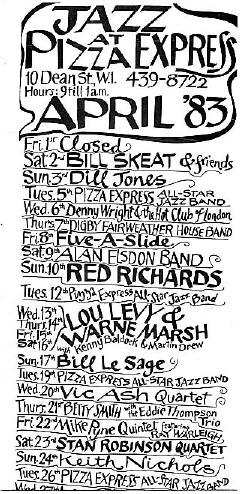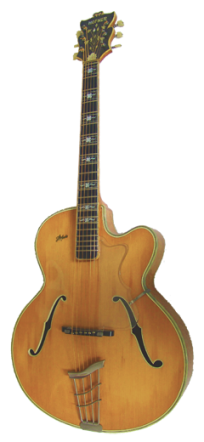Denny’s Oral History
of Jazz in Britain

Denny Wright had been suffering from bladder cancer for the past 6-year but has kept playing. His 1st jazz records in the early 30s, and his early guitar influences; came to playing the Guitar through the combination of friends and the records he heard; revels in his early reputation as the “British Django Reinhart”. His 1st Guitar was an Epiphone at age 8, sold to him by Len Williams father of John Williams. His 1st Band formed 1937, played in South East London; Denny’s brother on Rhythm Guitar, while Denny gravitated to lead. Member of Auxiliary Fire Service during the Blitz, suffered injuries and convalesced for 3 months in Morcambe; there met Guitarist Alan Metcalfe and started playing together; on return to London started playing at Jigg’s Club with Beryl Bryden. Memories of Jigg’s Club; working with Carl Barriteau & His Orchestra and its gradual collapse due to conscription; gigs in Dundee. End of the era of Big Band Orchestras in Theatre Venues, moved on 1st to Holiday Camp gigs, then to smaller ensembles at Clubs. Denny begins performing alone in both clubs and recording studios; joins Decca Records house-band under Phil Green; worked with Glenn Miller Band; “shortage” of Guitarists in London during the War benefited Denny. Memories of the Jamboree Club in Wardour Street.
Back in the late 50s, fronted ‘pick-up’ bands in US Air Force Bases in Germany; long anecdotes about life in Nuremburg & Paris; realised latterly that the reason for his wanderlust was his fears about marriage and his drinking. Less work on his return to England, because Denny was keeping away from his old drinking Partners; found his Guitar playing improved when dry, and that he got his taste for ‘Playing’ back.
Anecdote about Phil Green and his wife. Memories of performing at the Falado Club (Denis Rose, & Carrie Ware at The Bouliabare, which later became The Falado club); 1st place Bebop Music was heard in Britain; drug-taking in British Jazz at the time – deleterious effects of pot on Denny’s playing; hard-drug use and alcoholism in the scene; Police Raids of Jazz Clubs for Drugs, was instrumental in the Falado losing its Club Licence. Influence of George Shearing on scene’s piano players; Denny’s own piano playing, Live and in Studio. Denny on his guitar technique – inspired by Reinhardt and recordings, but almost entirely self-taught; the use of the thumb in his playing. Denny’s enforced departure from the UK; toured Italy & Egypt for 18 months entertaining Troops; begins to learn Latin style of playing. Playing briefly with Humphrey Lyttleton; joins Latin section of BBC Showband; at the same time as starting his own Band, also does Session work.
Denny was probably the 1st Guitarist-bandleader in Britain. Playing with Lonnie Donegan at beginning of Donegan’s hit-making career; Denny’s use of Electric Guitar in skiffle music; discusses tabloid campaign against Donegan. He openly discusses his alcoholism, and the fellow alcoholics he played with; has now been teetotal for more than 30 years. More about Session work, and growing fame in Donegan’s band; long anecdotes about showbiz stunts and performances. Denny’s wife and family in Bingley at this time; birth of their 1st son; Denny commuted to gigs and sessions in London every day; brief details of his relationship with Donegan – worked with him off and on until late 1970s.
Denny becomes indifferent to Showbiz; didn’t occur to him that the relationship with Donegan could make him famous in his own right; also, Denny’s Guitar style was more complex than was common in Skiffle music. Talks briefly about work with Digby Fairweather in Voyage Band during the 80s. Plays with Donegan again 60/61. Session work for Dusty Springfield, Tom Jones, etc. Mohammed Ali novelty record anecdote. Session Director for Pop Hits records – cover-versions of hit singles.
Discusses arrival of Al Jennings Band from the Caribbean in 1949 which included Lauderic Caton Guitarist – DW had just begun to listen to records outside American and British Jazz and liked the soloists. DW recounts meeting Django Reinhart in 1946, through Stephane Grapelli; Reinhardt’s attitude to his “copyists”. The Big Bands of the immediate post-war era, and DW’s experiences of “sitting-in” as a guest player; DW’s favourite guitarists of that era. Very few jazz guitarists around London at that time – DW and the few others got all the session work. DW’s rare ‘vocal’ work. The attitude of older musicians to young players at that time; being ignored and sometimes resented; anecdote about the young Johnny Dankworth. Session work – difficulty of playing arrangements written by people who clearly didn’t understand guitar.
Discusses end of his full-time stint with Lonnie Donegan; he then joins Johnny Duncan’s band in 1957. DW’s interest in Cuban-Latin music, his application of this style to pop hits; DW’s thoughts on the persistence of this Latin sound in modern pop music – Yello, – Gloria Estefan. DW’s alcohol intake peaks in the late 50s. Anecdotes about his time touring US air force bases in Germany; has a Damascian experience in Paris – he “loses” 4 days and nearly $1,500 through alcoholism; returns to the family home to dry out, gives up playing for 4 months. Avoids gigging work for the most part (some bands were hard-drinking units), and relies on session work for money; returns to Donegan’s band in 60/61, has a wonderful year with changing Bands; memories of Max Miller; gives up Donegan band when he realises that Tours are keeping him away from his young son. Memories of Cabaret Circuit and style at that time – the new craze for belly-dancing. His Pop Session work.
 Pop session work, continued – writing pop band arrangements of classical music; DW arranging and playing an album a month of budget cover versions for Music for Pleasure series and Rediffusion label. Playing the folk clubs at end of jazz club era; attends Cambridge Folk Festival with violinist Stefane Grappelli, near riot. Anecdote about Mohammed Ali novelty album – due for release at end of Rumble in the Jungle; DW wrote the arrangements, the session time was booked, but it fell apart. DW then discovers he is a diabetic and has to stop working for 6 months. Broadcast Performances. Velvet band of late 70s and 80s – formed from a studio session band DW had built up for Music for Pleasure label. His long series of reminiscences about Stefane Grappelli.
Pop session work, continued – writing pop band arrangements of classical music; DW arranging and playing an album a month of budget cover versions for Music for Pleasure series and Rediffusion label. Playing the folk clubs at end of jazz club era; attends Cambridge Folk Festival with violinist Stefane Grappelli, near riot. Anecdote about Mohammed Ali novelty album – due for release at end of Rumble in the Jungle; DW wrote the arrangements, the session time was booked, but it fell apart. DW then discovers he is a diabetic and has to stop working for 6 months. Broadcast Performances. Velvet band of late 70s and 80s – formed from a studio session band DW had built up for Music for Pleasure label. His long series of reminiscences about Stefane Grappelli.
Denny Wright discusses his current health; and how it has affected his playing – found he was less fluent and had less energy for tough playing; takes only gentle solos & rhythm work. Working and Touring with School-children in early 80s. Playing on Digby Fairweather Records during and after Velvet. The Co-operative Quartet ‘Velvet’ (formerly Stephane Grappelli’s Trio) with 2 Guitarists Denny Wright & Ike Isaacs and Bassist Len Skeat from 1977 to the 80’s
Attitudes in Jazz-world to BBC National Jazz Awards. Denny Wright’s ongoing battle with cancer; his wife’s death from cancer; he has had cancer in his breast and under his arm, which has limited his mobility both as a guitar-player and personally; has been offered Tour in the Netherlands, but can’t travel. Backtracks to late-40s period with Beryl Bryden, who shared a flat with Denny Wright’s 1st wife. CD reissue of some of Denny’s early records

Denny Wright on a Johnny Duncan Session with Ash Tray & Amp
 Denny played a Hofner Committee Guitar as above at a Johnny Duncan (his legs in the Image) rehearsal session – Note the basic amp.
Denny played a Hofner Committee Guitar as above at a Johnny Duncan (his legs in the Image) rehearsal session – Note the basic amp.
Available only from Selmer. Introduced 1953/4 and withdrawn in 1969. This was the ‘top of the range’ model (excepting the rare Hofner Golden).
Beginning life as an Acoustic – an Electric Model was introduced in 1957 followed by a Thinline Electric Model in 1959. The large ‘frondose’ Headstock characterises the Model though this was changed to a standard Hofner Headstock in 1963. It had a 17.5″ lower bout size changing to 18″ in 1963. The ‘Lyre‘ tailpiece was used until 1963 and it was then fitted with the ‘Escutcheon’ type. Solid or laminated carved spruce tops were used, with quality Birdseye Maple for the back & sides.